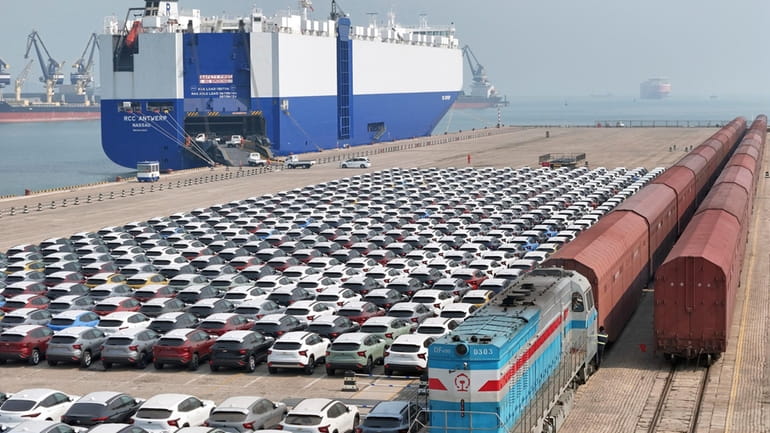China's exports tumble 7.5% in March and imports also fall as demand slows

A freight train carrying cars to be exported arrives at a dock for ro-ro shipping in Yantai in eastern China's Shandong province Sunday, March 3, 2024. China’s exports contracted in March after growing in the first two months of the year, underscoring the uneven nature of the country's recovery from the pandemic. Credit: AP
HONG KONG — China’s exports contracted in March after growing in the first two months of the year, underscoring the uneven nature of the country's recovery from the pandemic.
Customs data released Friday show exports declined 7.5% in March from a year earlier, while imports slipped 1.9%. Both figures fell short of estimates.
In the January-February period, exports rose 7.1% year-on-year while imports climbed 3.5%.
China, the world’s second-largest economy, posted a trade surplus of $58.55 billion in March. The surplus in the first two months of the year was $125 billion.
The decline in exports partly reflected a higher base of comparison with March 2023, when exports jumped 14.8% as the economy reopened after languishing under strict COVID-19 controls.
The economy has slowed in the medium-term partly due to a crisis in the property industry brought on by a crackdown on excessive borrowing. Weakness in exports would be a further drag on growth.
“We think export volumes will rise more slowly this year, given that consumer spending in advanced economies is cooling and the tailwind from last years sharp drop in export prices is fading,” Zichun Huang, a China economist at Capital Economics, said in a note.
But she said imports would probably gain momentum as higher government spending boosts demand.
An official survey of factory purchasing managers in March showed manufacturing activity expanding for the first time in six months. The survey showed an expansion in new export orders for the first time in nearly a year.
China has set a target of around 5% for economic growth this year, an ambition that will require more policy support, economists say.
The latest data belie worries that China might ramp up its exports to help meet its growth target, adding to excess capacity in many industries. Surging shipments of electric vehicles to Europe have raised alarm over whether Chinese-made EVs might crowd out those made by local manufacturers.
U.S. Treasury Secretary Janet Yellen made the issue of overcapacity a main topic of her recent visit to Beijing, where she met with Premier Li Qiang and other top leaders.
Exporters have been slashing prices to increase their sales abroad, but with losses mounting, the ability of manufacturers to cut prices is shrinking, Huang said.
Earlier this week, the government reported that consumer prices grew only 0.1% in March while producer prices declined 2.8%, suggesting weakness in demand relative to supply.
Wang Lingjun of the General Administration of Customs told reporters in Beijing that weak producer prices do not necessarily indicate overcapacity.
“The decline in prices is often related to various factors such as fluctuations in raw material prices, technological updates and adjustments and efforts of manufacturers to improve their profits,” Wang said.
Consumers worldwide favor Chinese products such as reliable and durable construction machinery and ceramics that are a “business card of Chinese civilization,” Wang said.
“Chinese goods are widely welcomed in the global community, relying on innovation and quality,” Wang said.
Two body parts suspects in court ... Teen chicken keeper ... Rangers advance ... Penn upgrades
Two body parts suspects in court ... Teen chicken keeper ... Rangers advance ... Penn upgrades
